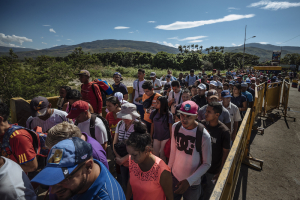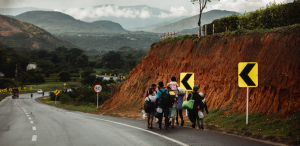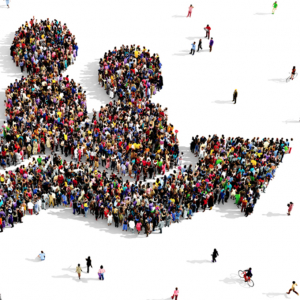Indicators in this domain assess the extent to which migrants have the same status as citizens in terms of access to basic social services such as health, education, and social security. It also describes the rights of migrants to family reunification, to work, and to residency and citizenship. The ratification of the main international conventions is also included within this domain.
Indicators in this category look at the extent to which migrants have access to certain social services such as health, education and social security. They also examine measures to ensure integration and access to work.
Indicators in this domain assess countries’ institutional, legal, and regulatory frameworks related to migration policies. Domain 2 also reviews the existence of national migration strategies that are in-line with development, as well as institutional transparency and coherence in relation to migration management. This domain also investigates the extent to which governments collect and use migration data.
Indicators in this category assess the institutional frameworks of cities for migration. This area also examines the existence of migration strategies consistent with development objectives, as well as institutional transparency and coherence in migration management.
This domain focuses on countries’ efforts to cooperate on migration-related issues with other states and with relevant non-governmental actors, including civil society organizations and the private sector. Cooperation can lead to improvements in governance by aligning and raising standards, increasing dialogue and providing structures to overcome challenges.
Indicators in this category focus on cities’ efforts to cooperate on migration issues with the national government as well as other cities and relevant non-governmental actors, including civil society organizations and the private sector.
This domain includes indicators on countries’ policies for managing the socioeconomic well-being of migrants, through aspects such as the recognition of migrants’ educational and professional qualifications, provisions regulating student migration and the existence of bilateral labour agreements between countries. Indicators equally focus on policies and strategies related to diaspora engagement and migrant remittances.
Indicators in this category assess cities’ initiatives in terms of international student mobility, access to the labour market and decent working conditions for migrant workers. Aspects related to diaspora engagement and migrant remittances are also included in this domain.
This domain studies the type and level of preparedness of countries when they are faced with mobility dimensions of crises, linked to either disasters, the environment and/or conflict. The questions are used to identify the processes in place for nationals and non-nationals both during and after disasters, including whether humanitarian assistance is equally available to migrants as it is to citizens.
Indicators in this category examine the type and level of readiness of cities to deal with aspects of mobility crises. The questions focus on the processes in place for citizens and non-citizens both during and after disasters, especially if humanitarian assistance is available for migrants and citizens.
This domain analyses countries’ approach to migration management in terms of border control and enforcement policies, admission criteria for migrants, preparedness and resilience in the case of significant and unexpected migration flows, as well as the fight against trafficking in human beings and smuggling of migrants. It also assesses efforts and incentives to help integrate returning citizens.
Indicators in this category look at the cities’ approaches to migrant safety as well as return and reintegration policies and the fight against trafficking in persons.
This country Profile describes examples of well-developed areas of the Republic of Madagascar (hereinafter referred to as Madagascar) governance structures and areas with potential for further development, as evaluated through the six domains of the Migration Governance Indicators (MGI). These address migrants’ rights, a “whole-of-government” approach, partnerships, socioeconomic well-being of migrants, the mobility dimensions of crises, and safe and orderly migration.
Click the icons on the wheel to explore the key findings.
The Migration Governance Indicators (MGI) initiative is a policy-benchmarking programme led by the International Organization for Migration (IOM) and implemented with research and analysis from the Economist Impact. Funding is provided by IOM Member States.
Migration Governance: examples of well-developed areas
- Migrants, regardless of their migratory status, have the same access to Government-funded health care as Malagasy citizens.
- Migrant workers have the same access as citizens to social protection.
- Family reunification is possible for all migrants living in the country and holding a long-term resident permit.
Areas with potential for further development
- Legislative texts make no clear reference to permanent residency.
- In order to transfer from one job to another, foreigners must declare their change of status to the Ministry of Labour, Employment, Public Services and Social Legislation for validation.
- Madagascar does not have a strategy to combat discrimination against migrants.
Migration Governance: examples of well-developed areas
- Madagascar has clear laws on immigration.
- The Interministerial Committee on Emigration is tasked with regulating emigration of Malagasy citizens and protecting their interests abroad.
- The Diaspora Directorate oversees the implementation of the National Policy for Engagement with the Malagasy Diaspora.
Areas with potential for further development
- The Government of Madagascar does not have a national migration policy.
- Migration data is not systematically collected and published.
Migration Governance: examples of well-developed areas
- The country participates in several regional consultative processes, including the Migration Dialogue for the Indian Ocean Commission Countries
- The National Labour Board brings together representatives of the Government, private-sector employers, and workers, including migrants.
- The Diaspora Directorate engages members of its diaspora in Madagascar’s development, in particular on the transfer of knowledge, skills and investment.
Areas with potential for further development:
- Madagascar has not concluded bilateral agreements or memorandums of understanding on migration issues with other countries.
- The Government only collaborates with the private sector and civil society organizations on labour migration.
Migration Governance: examples of well-developed areas
- Madagascar has introduced measures to promote gender equality in the labour market that are also applicable to migrant workers.
- The country has adopted measures to protect the rights of Malagasy citizens seeking to work abroad.
Areas with potential for further development
- There is no assessment of foreign labour demand and supply nor of the impact of emigration on the national labour market.
Migration Governance: examples of well-developed areas
- The Assistance Service for Malagasy citizens assists citizens living abroad in times of crisis.
- The Emigration Monitoring Service keeps a voluntary register of citizens living abroad.
Areas with potential for further development
- The National Disaster and Risk Management Policy and the National Disaster and Risk Management Strategy do not contain specific measures on assistance to migrants during and after crises in the country.
- The National Disaster and Risk Management Policy and Strategy do not mention migration related to climate change.
Migration Governance: examples of well-developed areas
- The National Office to Combat Trafficking in Persons monitors and coordinates anti-trafficking activities.
- The Ministry of the Interior and Decentralization the Economic Development Board of Madagascar monitor expired long-term visas and can take appropriate measures regarding the renewal.
- Madagascar has signed a regional agreement covering trafficking in persons and migrant smuggling, with neighboring countries in the Indian Ocean.
Areas with potential for further development
- Madagascar does not have policies in place for attracting Malagasy citizens who have emigrated.
- The National Office to Combat Trafficking in Persons collects and publishes statistics on trafficking in persons, but they are not accessible to the public.
2021 September




